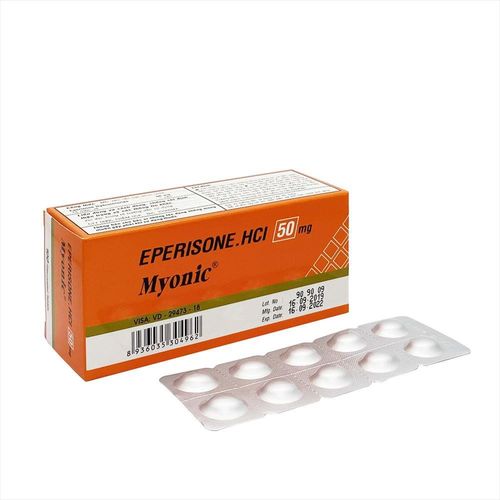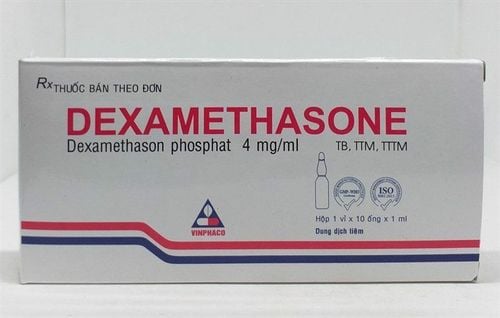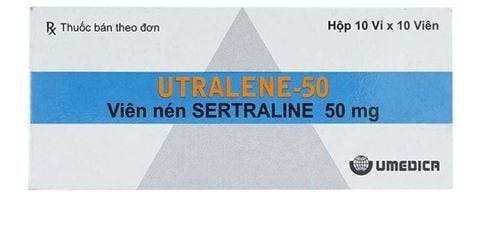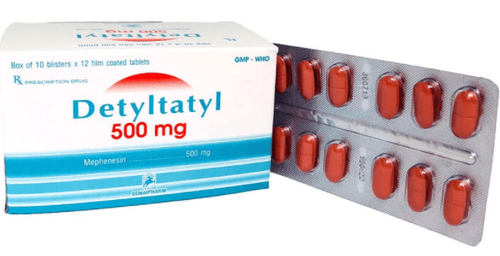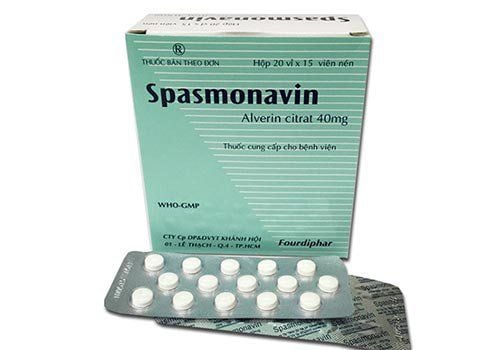This is an automatically translated article.
Jeforazon is a muscle relaxant, increasing muscle tone, containing the main ingredient is Tolperison, content 150mg. The drug has a central effect of muscle relaxant, used in cases of muscle spasticity or hypertonia such as after stroke, spinal cord injury...1. What is Jeforazon?
Jeforazon is an effective drug to improve muscle spasticity, or diseases that cause skeletal muscle hypertonia, to treat thromboembolic diseases because it contains the main active ingredient Tolperison hydrochloride. Sugar coated tablets are easy to take, is a Korean pharmaceutical product.Tolperison is a centrally acting muscle relaxant with a complex effect. Thanks to its membrane stabilizing and local anesthetic effects, the drug inhibits conduction in primary nerve fibers and motor neurons, thereby inhibiting polysynaptic or monosynaptic reflexes. Tolperison also inhibits the influx of Ca2+ into the synapse, participating in inhibiting the release of neurotransmitters. In brain stem cells, the drug inhibits the reticular-spinal reflex. The drug also has a circulatory effect, independent of the effects on the central nervous system, possibly because it is related to the mild antispasmodic and anti-adrenergic effects. After entering the body, the drug tolperison is well absorbed in the small intestine mucosa. Peak blood concentrations of the drug are reached 30 minutes to 1 hour after oral administration. Because the drug undergoes extensive first-pass metabolism, the bioavailability of Jeforzon is approximately 20%. A high-fat, high-fat meal can increase the bioavailability of the drug by up to 100% and also increase peak plasma concentrations by about 45% compared with dosing with a light meal. Peak blood concentrations are reached about 30 minutes after oral administration. The drug is extensively metabolised by hepatocytes and renal cells, and is eliminated mainly by the kidneys (with more than 99%) as metabolites.
2. Indications and contraindications of the drug Jeforazon
2.1. Indications for the use of Jeforazon
Jeforazon is used in the following cases:Jeforazon is used to treat symptoms of muscle spasticity in patients after stroke. Symptomatic treatment of skeletal muscle hypertonia in diseases such as organic neurological disorders (found in pyramidal tract lesions, spinal cord disease, multiple sclerosis, spinal cord disease, encephalomyelitis, etc.) ). Treatment of muscle hypertonia, symptoms of muscle spasms and spasms associated with movement diseases (including: spondylolisthesis, lumbar and neck syndromes, spinal rheumatism, arthropathy of large joints) . Treatment of thrombotic diseases (such as obstructive atherosclerosis, diabetic vascular complications, thromboembolic vasculitis, disseminated scleroderma, Raynaud's disease) as well as syndromes that arise on an aneurysm impaired neuro-vascular distribution such as syndrome causing cyanosis of the extremities, dyskinesia due to neuro-vascular disorders.
2.2. Contraindications to the use of Jeforazon
Do not use Jeforazon in the following cases:Patients with hypersensitivity, allergic reactions to tolperison or eperison-like substances, excipients in the drug Jeforazon. The patient has weakness.
3. Dosage and how to use Jeforazon
How to use: Jeforazon is used orally, patients should take the drug with water, after a main meal with a lot of fat, because fatty and oily foods increase bioavailability and also increase the peak concentration of the drug in the blood plasma.Dosage : Dosage of Jeforazon is prescribed by a doctor, patients should adhere to the treatment, or can refer to the manufacturer's dosage as follows:
Daily dose: 150-450 mg orally, divided equally into 3 next time eat. Depending on the cause of the disease, the condition of the patient, the dose may be different.
Overdose: Very rare because Jeforazon has a wide therapeutic range. The highest daily dose can be up to 600 mg but does not cause any serious symptoms of toxicity. Irritation has been observed in children after taking a dose of 300 - 600 mg a day. In preclinical acute toxicity studies, high doses of the drug may cause signs of ataxia, dyspnoea, tonic-clonic convulsions, respiratory paralysis.
Jeforazon drug poisoning has no specific antidote. If an overdose of Jeforazon occurs, the patient should receive supportive and symptomatic treatment.
4. Undesirable effects when using Jeforazon
Undesirable effects when using Jeforazon are mainly signs on the skin, subcutaneous tissue, systemic disorders, neurological disorders and gastrointestinal disorders. These include:Allergic reactions: Most reactions are not serious and are reversible. Rarely, life-threatening hypersensitivity reactions, increased sweating. Very rare: Cognitive confusion. Patients need to inform the doctor about unwanted side effects while using Jeforazon.
5. Notes in the process of using Jeforazon
Notes when using Jeforazon drug as follows:For patients with renal failure, liver failure: Clinically, an increase in the incidence of adverse events has been observed in this group of patients. For patients with moderate renal / hepatic impairment, it is necessary to determine the dose of the drug for each patient in combination with the process of closely monitoring the condition, disease progression and renal function and liver function tests. The use of Jeforazon is not recommended in patients with severe renal/liver failure. For children: The safety and effectiveness of Jeforazon in children have not been established. The drug should be used with caution in patients with allergies. The risk of hypersensitivity reactions is higher in women, in patients with a history of allergy or with a history of hypersensitivity to other drugs. Caution should be exercised when using the drug in patients who are sensitive to lidocaine because of the potential for cross-reactivity. Patients should be warned about the possibility of hypersensitivity reactions during administration. In case of any manifestation of allergic hypersensitivity, the drug should be stopped and promptly consulted with a doctor. Do not re-use Jeforazon in patients with a history of hypersensitivity to tolperison. Pregnant women: Due to insufficient relevant clinical data, it is recommended by experts not to use Jeforazon during pregnancy (especially during the first trimester) unless it is considered appropriate. The beneficial effects to the mother outweigh the risks to the fetus. Lactation: It is not known whether tolperison is excreted in human milk, therefore Jeforazon should not be used during lactation. Because Jeforazon can cause dizziness and lightheadedness, caution should be taken when using Jeforazon while driving and operating machinery. If you experience dizziness, lightheadedness, loss of concentration, seizures, blurred vision, or muscle weakness while taking tolperison, you should consult your doctor. Above is the article information about the use of Jeforazon drug. It is prescribed in the treatment of spasticity, central nervous system hypertonia, and thromboembolic disease. Patients should not arbitrarily use the drug, change the dose of the drug without the consent of the doctor. If you have any questions or concerns about Jeforazon, please consult a specialist, pharmacist or doctor.




